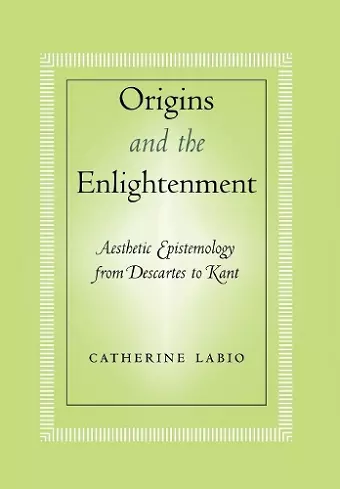Origins and the Enlightenment
Aesthetic Epistemology from Descartes to Kant
Format:Hardback
Publisher:Cornell University Press
Published:6th Oct '04
Currently unavailable, and unfortunately no date known when it will be back

What epistemic assumptions framed eighteenth-century thinkers' speculations regarding origins? What, if anything, connected these speculations? The best way to understand the Enlightenment's obsession with origins is to study it in conjunction with the contemporary conceptualization of originality as a criterion of aesthetic value, Catherine Labio maintains. Her expansive survey of the era's thought places special emphasis on epistemology and is genuinely interdisciplinary, drawing on such fields as anthropology, geometry, historiography, literary criticism, and political economy.
One of the most striking facets of Enlightenment thought, according to Labio, is the emergence of aesthetics as a master discourse that enabled its users to make sense of worlds ostensibly unrelated to the arts. In particular, once knowledge became defined as knowledge of things made by human beings, originality became valued not only for its novelty but also as a guarantee of epistemological certainty.
Labio analyzes the views held by a variety of European thinkers—including Baumgarten, Condillac, Descartes, Kant, Locke, Rousseau, Adam Smith, Vico, and Edward Young—on the origins of ideas, languages, nations, nature, and wealth. Throughout, the author deals with a wide range of primary and secondary materials.
"In a mature, far-reaching book, Catherine Labio explores the complexity and variety of early modern theories of origins, originality, and authorship, from Descartes and Vico to Kant. With erudition, attentiveness to philosophical arguments, and an evenhanded approach to earlier scholarship, she analyzes the profound tensions within the framework of the 'esprit systématique,' central to the Enlightenment project, between epistemological models based on simultaneity and synchrony and those based on linearity or successivity." -- Julie Candler Hayes, author of Reading the French Enlightenment: System and Subversion
"In Origins and the Enlightenment Catherine Labio does for epistemology what Terry Eagleton did for politics. Her argument is both novel and important: that it was during the Enlightenment, rather than the romantic period, that the status of that which is made (as opposed to that which is natural, or read from nature) acquired epistemological importance in the West. Labio works with a wide variety of primary sources and in four languages, while also keeping a broad range of primary and secondary materials together in a coherent manner." -- Tracy B. Strong, coeditor of Nietzsche's New Seas: Explorations in Philosophy, Aesthetics, and Politics
ISBN: 9780801442759
Dimensions: 229mm x 152mm x 22mm
Weight: 454g
208 pages